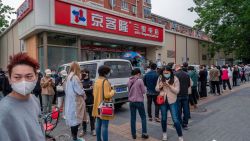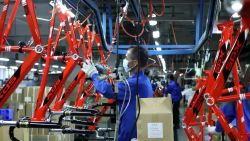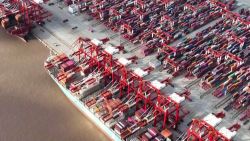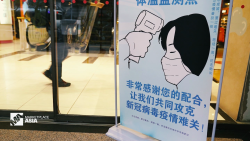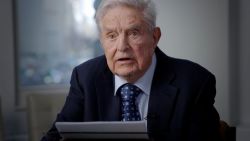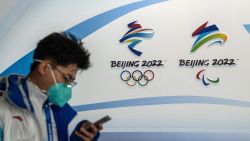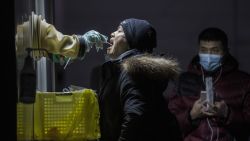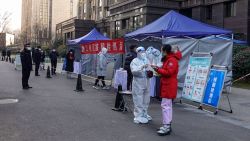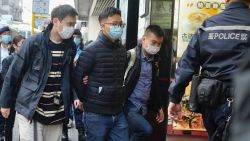Months of political unrest in Hong Kong have upended business in the city. Now restaurant and hospitality workers are feeling the pain.
Union officials told CNN Business last week that restaurants are laying off workers and forcing them to take unpaid leave. Major hotels are also asking workers to stay home — in some cases, for no pay — as business slows down.
The city’s economy was already suffering because of China’s slowdown and the US-China trade war. But the pro-democracy protests have complicated the business environment and presented a “triggering point” for some measures, like layoffs, said Tommy Wu, senior economist at Oxford Economics.
At least 700 restaurant workers have lost their jobs since June, the month when the protests evolved into massive demonstrations in the city’s streets, according to an industry union.
The mood in the workplace remains unsettled, too. Nearly half of the 500 workers who answered a survey conducted by the Eating Establishment Employees General Union said they expected their companies to respond to the protests by cutting back on labor costs.
Even those who keep their jobs aren’t safe from hardship. Many restaurants are already asking their employees to take time off without pay, according to a spokesperson for that union, which represents about 9,000 members.
Time off without pay
It’s not just the food industry. The InterContinental, a luxury hotel in Hong Kong, recently told all staff to take several days of both paid and unpaid leave, according to an internal email. The memo was shared with CNN Business by the Catering and Hotel Industries Employees General Union, which in turn received it from a source.
“All of you know the situation that Hong Kong has been facing since the beginning of June 2019 with the protests,” Claus Pedersen, the property’s general manager, wrote in the memo. He added that occupancy levels, along with revenue from the company’s food and beverage unit, were both “down considerably.”
“In view of this, it is only right we take ‘corrective measures,’” he added. The company did not respond to multiple requests from CNN Business for comment.

That kind of scenario has become more common, according to Michael Chan, an organizer at the Catering and Hotel Industries Employees General Union. His group has found that as many as 14 hotels have asked workers to take unpaid leave.
It’s not unheard of for hotels to encourage workers to use their vacation during a slow season, Chan noted. That’s how things work in seasonal industries, like hospitality.
But he said asking someone to take time off without pay is a rarity, and can make a big difference in the lives of hotel workers, who typically earn around 16,000 Hong Kong dollars (about $2,000) a month.
One employee at a five-star hotel in Hong Kong said that he had seen a dramatic drop in bookings over the last three months, and that staffers were also being urged to clear their annual holidays. He requested anonymity because he’s not authorized to discuss internal matters.
This time last year, the occupancy rate at the property where he works was about 70% to 80%, he told CNN Business. Right now it’s closer to 50%, and at one point, even plunged to 20%, he said.
A drop in tourism
The Mira Hotel, a high-end property owned by real estate company Henderson Land, confirmed it had recently asked workers to clear their annual leave. A spokesperson for the hotel said it was standard practice for the company to do so around this time, and declined to comment on its occupancy rate.
“We are in line with the overall hospitality market” in Hong Kong, she said.
While some businesses were suffering before the protests escalated, the tourism and hotel industry was hit particularly hard. Hong Kong was the most visited city in the world last year, according to Euromonitor. Hotels enjoyed an average occupancy rate of 91% in 2018.
But the protests have hurt the city’s image. Operations at Hong Kong’s international airport temporarily shuttered last month, grounding hundreds of flights. Dozens of countries have issued travel warnings for Hong Kong and the number of visitor arrivals fell substantially in the first half of August, according to official preliminary data.
In July, the city’s hotel occupancy rate fell to 86% compared to 91% the same time last year, according to statistics released Friday by the Hong Kong Tourism Board.
Wu, the Oxford Economics economist, attributed the hotel sector’s slowdown mostly to “recent political turmoil.”

With no end in sight to the protests, it’s not clear when business will go back to normal.
The city is already bracing for further disruption. The travel industry has reported that the number of forward bookings — or the number of trips people are planning to take to Hong Kong — has dropped significantly for September and October, according to a spokesperson for the Hong Kong Tourism Board.
Some airlines have also started cutting routes in Hong Kong, citing weak demand. United Airlines confirmed last month that the company would suspend daily service from Chicago to Hong Kong starting in September. Qantas (QABSY) also recently said that it planned to downgrade its capacity in Hong Kong.
Other carriers may soon follow suit. Korean Air said last week that bookings to the city had fallen, and warned that it could consider reducing capacity on Hong Kong routes if the situation continues.
“By the end of [September], I am very much hoping that things would have taken a turn for the better and certainly not for the worse,” wrote Pedersen.
Caroline Malone, Kay Guerrero and Alice Barnard contributed to this report.



